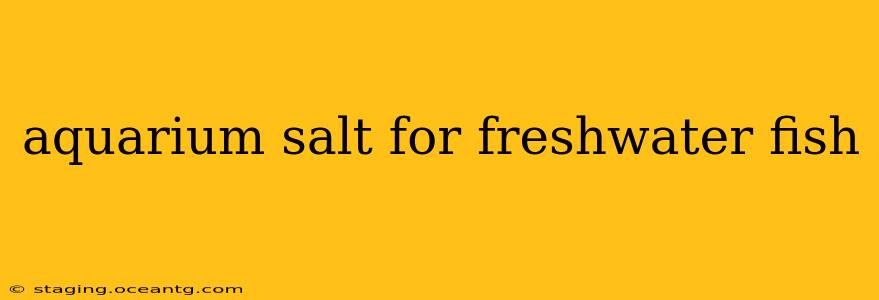Adding aquarium salt to freshwater aquariums is a practice that sparks considerable debate among fish keepers. While some swear by its benefits, others view it as unnecessary or even harmful. This comprehensive guide will delve into the uses, benefits, and potential drawbacks of using aquarium salt in your freshwater tank, answering many common questions and helping you make an informed decision.
What is Aquarium Salt and How Does it Differ from Table Salt?
Aquarium salt, also known as aquatic salt, is specifically formulated for use in aquariums. Unlike table salt, which contains additives like iodine and anti-caking agents that can be harmful to fish, aquarium salt is pure sodium chloride (NaCl). This purity is crucial for ensuring the safety of your aquatic inhabitants.
When Should You Use Aquarium Salt in a Freshwater Tank?
While not a routine additive, aquarium salt can be beneficial in specific situations:
-
Treating Infections and Parasites: Aquarium salt creates a mildly hypertonic environment, drawing water out of parasites and bacteria, hindering their growth and potentially killing them. This is particularly useful in treating minor infections like fin rot, ich (white spot disease), and other common ailments.
-
Reducing Stress During Transportation or Quarantine: The addition of aquarium salt can help reduce stress on fish during transportation or when quarantined in a new tank. It can aid in osmotic regulation, helping them adjust to their new environment more smoothly.
-
Treating Fish with Osmotic Imbalances: Certain fish species might suffer from osmotic imbalances leading to bloating or other issues. In these cases, controlled use of aquarium salt under veterinary guidance can help restore balance.
-
Supporting the Immune System: Some believe that low concentrations of aquarium salt can subtly bolster the fish's immune system, making them more resilient to disease.
H2: How Much Aquarium Salt Should I Use?
The correct dosage is crucial. Too little won't have much effect, while too much can be toxic. A common guideline is 1 teaspoon per 5 gallons of water. However, this is just a starting point. It's important to monitor your fish closely for any adverse reactions. Any changes should be gradual, and if you observe any signs of distress, immediately perform a large water change.
H2: What are the potential negative effects of using aquarium salt?
While generally safe in appropriate doses, excessive aquarium salt can be harmful to your fish and plants. High salinity can damage delicate fish species and even affect the growth of beneficial bacteria in your filter. It's also important to note that the use of aquarium salt can alter water parameters (e.g., increase the specific gravity), and certain medications and treatments may not interact well with the salt.
H2: Can I use table salt in my freshwater aquarium?
No, absolutely not. Table salt contains additives that are toxic to fish. Always use aquarium salt specifically formulated for aquatic use.
H2: Does aquarium salt affect my plants?
Yes, high concentrations of aquarium salt can harm some freshwater plants. It's important to monitor your plants carefully and adjust the dosage accordingly if you notice any negative effects. Some delicate plant species are more sensitive than others.
H2: My fish is sick. Should I automatically use aquarium salt?
While aquarium salt can be helpful in treating some fish diseases, it's not a cure-all. Proper diagnosis is essential. Observe your fish for specific symptoms and consult with an experienced fish keeper or a veterinarian specializing in aquatic animals before using any treatment, including aquarium salt.
H2: How do I add aquarium salt to my aquarium?
Dissolve the salt completely in a separate container of aquarium water before adding it to the main tank. This prevents localized high concentrations that could harm your fish.
Conclusion:
Aquarium salt can be a valuable tool in a freshwater fish keeper's arsenal, but it's important to use it judiciously and responsibly. Always start with a low concentration, monitor your fish closely for any adverse reactions, and never substitute table salt. Remember, prevention is better than cure; maintaining a healthy aquarium environment through proper water parameters, a balanced diet, and regular water changes is far more effective than relying solely on aquarium salt to solve problems.
